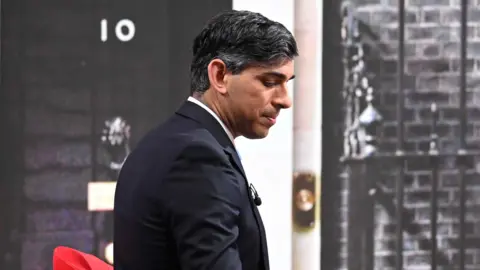 BBC
BBCThere are just three days left until this grassroots election campaign is successful and the fate of Britain’s leading politicians is in the hands of the citizens.
This is not the time to expand the scope of the campaign. This in turn becomes narrower as the events – particularly the two major events – focus on the core messages they hope to attract to the very powerful parts of the British crowd they want to win over.
When you hear Rishi Sunak or Sir Keir Starmer say something these days, expect to hear them say it today and on Wednesday too. This is not a day of change but of repetition.
So what are those messages? Clearly, Mr Sunak believes he will remain Prime Minister until the end. At least that’s what he told Laura Kuenssberg the day before today.
Take a look at the Conservative marketing campaign as it enters into domestic expansion, despite the fact, and it’s undeniably tilted into a defensive posture.

It is reductive to imagine that Prime Minister Sunak had walked down Downing Side Road to announce this general election 40 days ago, expecting to spend the normal 3 days of the campaign delivering such a huge ultimatum of a Labor victory that Sir Kier displayed “unbridled” energy.
No matter what they say publicly, the way the Conservatives are approaching this time suggests they believe at least serious opinion polling is reliable.
Campaigning in the Midlands these days, Mr Sunak has given the ultimatum that no matter what Nigel Farage claims, Reform UK cannot hope to be a real opposition because they “will not win enough votes to oppose Labour”.
He is expected to say: “Just imagine that – hundreds and hundreds of Labor MPs opposed by only one, two, three, four, five elected (Reform) MPs.”
Please note that this argument is taken to account for the fact that there will be a large number of Labor MPs.
This notion speaks to the difficult multidirectional battle facing conservatives right now: trying to ban citizens moving toward labor, but also other former conservatives moving toward reform and, in other parts of the country. In the U.S., other arguments are being used to impose sanctions on the Liberal Democrats.
The candidate controversies of recent days, as well as Mr Farage’s claim that the West has “provoked” the war in Ukraine, have at least given the Conservatives something they were struggling to find in the campaign – Reform UK A way to attack.
Some Conservative candidates wish they had already accomplished something.
This is the crowd’s talk going on at the Conservative birthday celebrations, with three days left to go. After this there is another dialogue, which ranges from semi-public to non-public. What’s coming?
These days in The TelegraphJesse Norman, a former ministerial candidate for re-election, has written an 813-word article regarding the election.
It is no longer a general election that he thinks will happen to Labor in its first draft, but a Conservative leadership election that he believes will follow.
Mr Norman considers the possibility that members of Conservative parties should have a reduced role, and should not be hindered in leadership elections.
Some of Mr Norman’s colleagues are focused less on the process but rather on the applicants – despite the fact that the question could be framed around who is left in Parliament on 5 July.
What about labour?
The labor process is easy in the same appreciation. In England, it is at least fighting in one direction – trying to win over former Conservative citizens. (Even if there is some very quiet nervousness in some Labor seats, particularly in South Yorkshire, about the conceivable gardens of reform power).
They are relieved and pleased that they have completed the entire marketing campaign with a consistent one-word message: Exchange.
Please note that the message is being prepared in the last days, however, to warn citizens that “you have to vote for it” if they want the option.
It betrays more than a glimpse of outrage that some potential Labor citizens may view the result as a foregone conclusion and stay home or vote for another birthday party as a result.
Despite the fact that the dominant mode is bullish. For that just take a look at the fact that Sir Keir started his election campaign today in Hitchin – the part of Hertfordshire where Mr Sunak was a Labor MP six years before he was born.
 reuters
reutersLabor’s own semi-public, semi-private conversation also extends far and wide. It is still being claimed publicly, as John Ashworth did this morning, that the Conservatives could win the overall election.
Privately, Labor circles are full of talk about the presidential system.
It has been the fiefdom of chief-of-staff Sue Grey, whom Sir Keir controversially usurped at the pinnacle of a career in civil service. After 14 years in opposition, some senior members of the Labor Party, whether MPs or officials, have no pleasure in being in government – which is a key reason why Sir Keir appointed Ms Gray.
Interestingly, if Labor wins, Ms Gray is more likely to join Downing Side Road through Morgan McSweeney, who has run the party’s election campaign.
At that tournament, a potential Labor government should be expected to briefly announce that what they have uncovered in the government books is worse than they expected – a controversy the Institute for Financial Research (IFS) has raised . Already surprised.
Labor strategists believe David Cameron has gone a long way to securing the Conservatives’ 2015 election victory since becoming prime minister in 2010 – when he took office to launch a concerted attack on Labour’s record Sorted out. Have similar expectations once again.
In reality, Labor probably won’t get there. The most effective postal vote has ever been created.
Although the manufacturer denied fault – given the way the two major parties have been campaigning in those final days, each of them believes this is the most credible situation.
Discover more from news2source
Subscribe to get the latest posts sent to your email.





